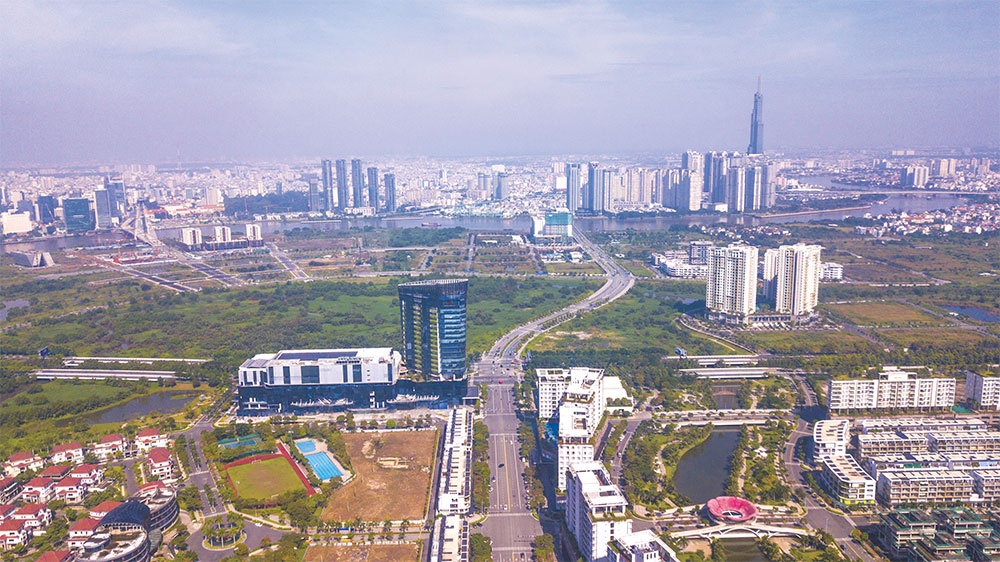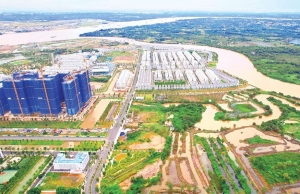Real estate investors hitting capital wall
Nguyen Hung, a director from a private real estate developer, said that over the last five months, his sales revenue had been almost zero. This caused construction-related activities to stop and he cannot pay salaries. The bank will not give loans, and products remain unsold, all adding to the company’s misery.
“Currently, I have to pay more than VND30 billion ($1.3 million) for office leasing and salaries per month, but we do not have money left in our pocket,” Hung told VIR.
 |
| Real estate investors hitting capital wall, Le Toan |
To get capital, the only way now for businesses is to raise capital from foreign investment funds such as in Japan, Thailand, or Singapore. However, it is not easy because it often takes up to two years to complete a deal.
“Foreign investment funds also only pour money into specific projects and take share benefit but not invest in just any companies. They only participate in projects with good revenue and have the potential for price increases,” Hung said.
“From now until the end of October, we hope the company will complete the contract with a foreign investment fund that we have worked with for nearly a year. If not, we have to wait a few more weeks to hope for the government to extend more room for credit for survival.”
A leader of another large real estate group in the Mekong Delta province of Long An said that in the past, the company bought distressed projects to develop. To have money to buy projects, this company has to borrow capital from banks. However, now it is a tough time for any loans from banks, and his current solution is to suspend all projects and wait for new monetary policy signals.
“Currently, not only is credit tightening, but administrative, policy and legal procedures are also frozen due to reviews from competent bodies for all projects. Businesses are struggling to survive,” he said.
Multiple difficulties
Independent real estate expert Ho Huu Khanh said that the real estate market has never been as difficult as it is today.
“A decade ago when the market was frozen there was no liquidity, but the bank still gave loans and customers still had money to pay for the contracts signed previously. Now, the market has frozen again, the bank has tightened its capital, and the administrative procedures are lengthy, making the difficulties of enterprises much worse,” Khanh said.
A solution to have a loan from an international financial institution and partners is feasible, but it takes time, and there are many conditions, Khanh added.
If, in the past few years, bonds have been an effective capital mobilisation channel for businesses, then in the first seven months of 2022, real estate enterprises only issued VND45 trillion ($1.96 billion) of bonds, a sharp decrease compared to previous years.
The worrying slowdown of the real estate corporate bond market has caused many projects not to continue to be implemented, and many businesses cannot pay their outstanding bond dues.
The real estate market plays an important role in the economy. In 2021, it contributed 3.58 per cent of GDP and construction 5.95 per cent. In the first six months of 2022, it contributed 3.32 per cent of GDP and construction 5.44 per cent.
Dr. Can Van Luc, a member of the National Fiscal and Monetary Policy Advisory Council, said that capital attraction in the real estate market was important because it involved about 35 different fields and industries.
However, statistics from listed real estate businesses show that the number of days of inventory is skyrocketing to an alarming level. The average number of days of inventory has nearly reached 1,500, meaning it takes more than four years to sell out inventory. This number has increased sharply compared to the end of 2021 and approximately doubled compared to the 2019-2020 period.
Luc said that the recent phenomenon of stagnation of capital for businesses was painful, with excess supply, excess resources, and a lack of capital.
“Currently, about 30-40 per cent of real estate and construction businesses have loans from each other with an amount of about $2.6 billion. Previously they extended it to 45 days, but now it has been up to 90 days. Therefore, cash flow slows down, and this is a difficulty for construction and real estate businesses,” Luc said
Struggling for cash flow
Faced with a serious thirst for capital when credit valves and bond issuance activities were tightened, many real estate businesses had to find new capital mobilisation channels to maintain their cash flow.
In June 2022, Novaland announced an investment of $250 million from a group of investment funds led by Warburg Pincus. This is expected to be allocated to increase land banks and project development in strategic locations, taking advantage of the gradually improving infrastructure in the southern region.
Similarly, also in June, Hung Thinh Land Corporation has just received an equity investment of $103 million from Dragon Capital and VinaCapital.
The transaction brings Hung Thinh Land into the international capital market for the first time, creating a favourable foundation to support the implementation of the strategy and sustainable growth plan.
In June, the International Finance Corporation registered to buy bonds with a total value of about $44 million from Nam Long Investment JSC.
Meanwhile, Dien Phuc Thanh House and Construction Company, the investor of the MT Eastmark City project, has announced a package for those wanting to own a home with finances of less than VND1 billion ($43,500).
With an initial capital of about 30 per cent of the apartment value, customers can receive the house, and the remaining 70 per cent is given loans by the bank and disbursed according to the project’s progress. The main difference is that the investor supports all interest rates and a grace period of up to 30 months.
Similarly, to stimulate demand at Bcons City and Bcons Plaza projects, their investor Bcons Group applies interest rate support and a principal debt grace period during project construction.
At the Phu Dong Sky Garden project, Phu Dong Real Estate JSC offers a flexible payment policy to support customers soon having their houses. If customers have enough finance to buy the unit without loans, they will enjoy a discount of 5-10 per cent of the total value.
In addition, joint purchasing of real estate products are becoming more popular to mobilise capital flow from individuals who have little investment available for real estate.
Investors of certain real estate products can divide the value of that property into several parts. Each investor can contribute capital from hundreds to thousands of USD. Capital contributors will receive investment certificates on application, which can be held until maturity to receive back their capital and interest at the rate of profit that was initially committed. Investors can also transfer their certificates to other investors.
 | More clarity urged for draft guidelines of new Land Law Although the draft amended Land Law is deemed to meet the requirements for Vietnam’s economic development, it remains unclear whether it can solve practical problems in land acquisition, speculation, and valuation. |
 | The advantages and challenges of joint real estate investment in Vietnam Vietnam’s real estate market outlook remains positive, driven by strong domestic and foreign demand for housing and investment. However, high initial investment value and low liquidity are major barriers preventing individual and institutional investors from participating in large-scale projects with stable cash flow in Vietnam. Therefore, residential real estate is always a sought-after property for individual investors. |
 | New methods for small property investors Although a new model in Vietnam, buying split real estate is considered an effective investment channel for those with little capital, especially in the current market with limited cash flow. |
What the stars mean:
★ Poor ★ ★ Promising ★★★ Good ★★★★ Very good ★★★★★ Exceptional
Related Contents
Latest News
More News
- An Phat 5 Industrial Park targets ESG-driven investors in Hai Phong (January 26, 2026 | 08:30)
- Decree opens incentives for green urban development (January 24, 2026 | 11:18)
- Public investment is reshaping real estate’s role in Vietnam (January 21, 2026 | 10:04)
- Ho Chi Minh City seeks investor to revive Binh Quoi–Thanh Da project (January 19, 2026 | 11:58)
- Sun Group launches construction of Rach Chiec sports complex (January 16, 2026 | 16:17)
- CEO Group breaks ground on first industrial park in Haiphong Free Trade Zone (January 15, 2026 | 15:47)
- BRIGHTPARK Entertainment Complex opens in Ninh Binh (January 12, 2026 | 14:27)
- Ho Chi Minh City's industrial parks top $5.3 billion investment in 2025 (January 06, 2026 | 08:38)
- Why Vietnam must build a global strategy for its construction industry (December 31, 2025 | 18:57)
- Housing operations must be effective (December 29, 2025 | 10:00)

 Tag:
Tag:


















 Mobile Version
Mobile Version